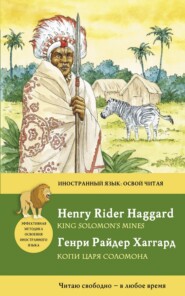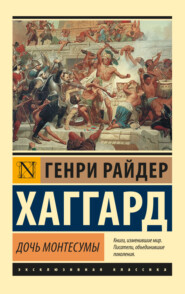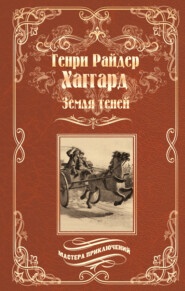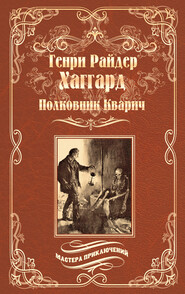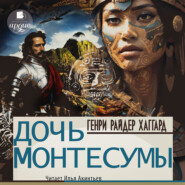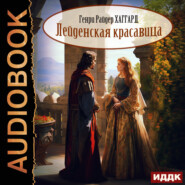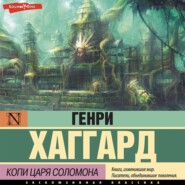По всем вопросам обращайтесь на: info@litportal.ru
(©) 2003-2024.
✖
Allan and the Ice-Gods
Автор
Серия
Год написания книги
1927
Настройки чтения
Размер шрифта
Высота строк
Поля
“Yes,” added Whaka the Bird-of-Ill-Omen, “but if he who challenges is defeated, not only is he killed, his family is killed also” – here he glanced at Aaka and Foh – “and perhaps his friend or brother” – here he looked at Moananga. “Yes, without doubt that is the law. The cave only belongs to the chief while he can defend it with his hands. If another rises who is stronger than he, he may take the cave, and the women, also the children if there are any, and kill them or make them slaves, until his strength begins to fail him and he in turn is killed by some mightier man.”
“I know it,” said Wi. “Hearken again. Henga has done me wrong; he stole and murdered my daughter Fo-a. Therefore I would kill him. Also he rules the tribe cruelly. No man’s wife or daughter or robe or food is safe from him. His wickedness makes the gods angry. Why is it that the summers have turned cold and the spring does not come? I say it is because of the wickedness of Henga. Therefore, I would kill him and take the cave, and rule well and gently so that every man may have plenty of food in his hut and sleep safe at night. What say you?”
Now Wini-wini the Shudderer spoke, shaking in all his limbs:
“We say that you must do what you will, Wi, but that we will not mix with the matter. If we mix, when you are killed, as you will be – for Henga is mightier than you – yes, he is the tiger, he is the bull of the woods, he is the roaring bear – then he will kill us also. Do what you will, but do it alone. We turn our backs on you, we put our hands before our eyes and see nothing.”
Pag spat upon the ground and said in his low, growling voice that seemed to come out of his stomach:
“I think that you will see something one night when the stars are shining. I think, Wini-wini, that one night you will meet that which will make you shudder yourself to pieces.”
“It is the wolf-man,” exclaimed Wini-wini. “Protect me! Why should the wolf-man threaten me when we are gathered to talk?”
Nobody answered, because if some were afraid of Pag, all, down to the most miserable slave-woman, despised Wini-wini.
“Take no heed of his words, Brother,” said Moananga the Happy-faced. “I will go up with you to the cave-mouth when you challenge Henga, and so I think will many others to be witnesses of the challenge, according to the custom of our fathers. Let those stop behind who will. You will know what to think of them when you are chief and sit in the cave.”
“It is well,” said Wi. “Let us go at once.”
Chapter 5
The Ax that Pag Made
This matter being settled, there followed a jabber of argument as to the method of conveying the challenge of Wi to Henga the chief. Urk the Aged was consulted as to precedents and made a long speech in which he contradicted himself several times. Hou the Unstable sprang up at length and said that he was not afraid and would be the leader. Suddenly, however, he changed his mind, declaring he remembered that this office by right belonged to Wini-wini the Horn-Blower, who must sound three blasts at the mouth of the cave to summon the chief. To this all assented with a shout, perhaps because there was a sense of humour even in their primitive minds, and protest as he would, Wini-wini was thrust forward with his horn.
Then the procession started, Wini-wini going first, followed close behind by Pag in the bleeding wolfskin, who, from time to time, pricked him in the back with his sharp flint knife to keep him straight. Next came Wi himself with his brother Moananga, and after these the elders and the rest of the people.
At least, they started thus to cover the three hundred paces or so which lay between them and the cliff, but before they reached the cave, most of them lagged behind so that they were dotted in a long line reaching from the meeting place to its entrance.
Indeed, here remained only Wini-wini, who could not escape from Pag, Wi, Moananga, and, at a little distance behind, Whaka the Bird-of-Ill-Omen, prophesying evil in a ceaseless stream of words. At his side, too, was Aaka, walking boldly and looking down at his withered shape with scorn. Of the remainder, the bravest, drawn by curiosity, kept within hearing, but the rest stayed at a distance or hid themselves.
“Blow!” growled Pag to Wini-wini and, as he still hesitated, pricked him in the back with his knife.
Then Wini-wini blew a quavering blast.
“Blow again louder,” said Pag.
Wini-wini set the horn to his lips, but before a sound came out of it, a large stone hurled from the cave struck him in the middle and down he went, writhing and gasping.
“Now you have something to shake for,” said Pag, as he waddled to one side lest another stone should follow.
None came, but out of the cave with a roar rushed a huge, hairy, black-browed fellow waving a great wooden club – Henga himself. He was a mighty, thick limbed man of about forty years of age, with a chest like a bull’s, a big head from which long black hair fell upon his shoulders, and a wide, thick-lipped mouth whence projected yellow tusk-like teeth. From his shoulders, in token of his rank, hung the hide of a cave tiger and round his neck was a collar made from its claws and teeth.
“Who sends that dog to waken me from my rest?” he shouted in his bellowing voice, and pointed with the club to Wini-wini, twisting on the ground.
“I do,” answered Wi, “I and all the people. I, Wi, whose child you murdered, come to challenge you, the chief, to fight me for the rule of the tribe, as you must do according to the law, in the presence of the tribe.”
Henga ceased from his shouting and glared at him.
“Is it so?” he asked in a quiet voice that had in it a hiss of hate. “Know that I hoped that you would come on this errand and that is why I killed your brat to give you courage, as I will kill the other that remains to you,” and he glanced at the boy Foh who stood at a distance. “You have troubled me for long, Wi, with your talk and threats against me, of which I am hungry to make an end. Now, tell me, when does it please the people to see me break your bones?”
“When the sun is within an hour of its setting, Henga, for I have a fancy to sleep in the cave to-night as chief of the people,” answered Wi quietly.
Henga glowered at him, gnawing at his lip, then said:
“So be it, dog. I shall be ready at the meeting place an hour before the sun sets. For the rest, it is Aaka who will sleep in the cave to-night, not you who I think will sleep in the bellies of the wolves. Now begone, for a salmon has been sent to me, the first of the year, and I who love salmon would cook and eat it.”
Then Aaka spoke, saying:
“Eat well, devil-man who murders children, for I, the mother, tell you that it shall be your last meal.”
Laughing hoarsely, Henga went back into the cave, and Wi and all the others slipped away.
“Who gave Henga the salmon?” asked Moananga idly, as one who would say something.
“I did,” answered Pag, who was walking beside him but out of earshot of Wi. “I caught it last night in a net and sent it to him, or rather caused it to be laid on a stone by the mouth of the cave.”
“What for?” asked Moananga.
“Because Henga is greedy over salmon, especially the first of the year. He will eat the whole fish and be heavy when it comes to fighting.”
“That is clever; I should never have thought of that,” said Moananga. “But how did you know that Wi was going to challenge Henga?”
“I did not know, nor did Wi. Yet I guessed it because Aaka sent him to consult the gods. When a woman sends a man to seek a sign from the gods, that sign will always be the one she wishes. So at least she will tell him, and he will believe.”
“That is cleverer still,” said Moananga, staring at the dwarf with his round eyes. “But why does Aaka wish Wi to fight Henga?”
“For two reasons. First, because she would revenge the killing of her child, and, second, because she thinks that Wi is the better man, and that presently she will be the wife of the chief of the tribe. Still, she is not sure about this, because she has made a plan, should Wi be defeated, that I must kill her and Foh at once, which I shall do before I kill myself. Or perhaps I shall not kill myself, at any rate, until I have tried to kill Henga.”
“Would you then be chief of the tribe, Wolf-man?” asked Moananga, astonished.
“Perhaps, for a little while; for do not those who have been spat upon and reviled always wish to rule the spitters and the revilers? Yet I will tell who are Wi’s brother and love him that, if he dies, I, who love him better and love no one else, save perhaps Foh, because he is his son, shall not live long after him. No, then I should pass on the chieftainship to you, Moananga, and be seen no more, though perhaps in the after years you might hear me at night howling round the huts in winter – with the wolves, Moananga, to which fools say I belong.”
Moananga stared again at this sinister dwarf whose talk frightened him. Then, that he might talk of something else, asked him:
“Which of these two do you think will conquer, Pag?”
Pag stopped and pointed to the sea. At some distance from the shore a mighty struggle was in progress between a thresher shark and a whale. The terrible shark had driven the whale into shallow water, where it floundered, unable to escape by sounding. Now the sea wolf, as it is called, was leaping high in to the air, and each time as it fell it smote the whale upon the head with its awful sword-like tail, blow upon blow that echoed far and wide. The whale rolled in agony, beating the water to a foam with its giant flukes, but for all its size and bulk could do nothing. Presently, it began to gasp and opened its great mouth, whereon the thrasher, darting between its jaws, seized its tongue and tore it out. Then the whale rolled over and began to bleed to death.
“Look,” said Pag. “There is Henga the huge and mighty and there is Wi the nimble, and Wi wins the day and will feed his fill upon whale’s flesh, he and his friends. That is my answer, and the omen is very good. Now I go to make Wi ready for this battle.”
When Pag reached the hut, he sent Aaka and Foh out of it, leaving himself alone with Wi. Then, causing Wi to strip off his cloak, he made him lie down and rubbed him all over with seal oil. Also, with a sharp flint and a shell ground to a fine edge, slowly and painfully he cut is hair short, so short that it could give no hold to Henga’s hand, and, this done, greased what remained of it with the seal oil. Next he bade Wi sleep awhile and left the hut, taking with him Wi’s stone ax, also his spear, that with which he had killed the wolf, and his flint knife that was hafted with two flat pieces of ivory rubbed down from a walrus tusk and lashed onto the end of the flint.
Outside the hut, he met Aaka, who was wandering to and fro in an ill-humour. She made as though she would pass him, set ting her face toward the hut.
“Nay,” said Pag, “you do not enter.”
“Why not?” she asked.
“I know it,” said Wi. “Hearken again. Henga has done me wrong; he stole and murdered my daughter Fo-a. Therefore I would kill him. Also he rules the tribe cruelly. No man’s wife or daughter or robe or food is safe from him. His wickedness makes the gods angry. Why is it that the summers have turned cold and the spring does not come? I say it is because of the wickedness of Henga. Therefore, I would kill him and take the cave, and rule well and gently so that every man may have plenty of food in his hut and sleep safe at night. What say you?”
Now Wini-wini the Shudderer spoke, shaking in all his limbs:
“We say that you must do what you will, Wi, but that we will not mix with the matter. If we mix, when you are killed, as you will be – for Henga is mightier than you – yes, he is the tiger, he is the bull of the woods, he is the roaring bear – then he will kill us also. Do what you will, but do it alone. We turn our backs on you, we put our hands before our eyes and see nothing.”
Pag spat upon the ground and said in his low, growling voice that seemed to come out of his stomach:
“I think that you will see something one night when the stars are shining. I think, Wini-wini, that one night you will meet that which will make you shudder yourself to pieces.”
“It is the wolf-man,” exclaimed Wini-wini. “Protect me! Why should the wolf-man threaten me when we are gathered to talk?”
Nobody answered, because if some were afraid of Pag, all, down to the most miserable slave-woman, despised Wini-wini.
“Take no heed of his words, Brother,” said Moananga the Happy-faced. “I will go up with you to the cave-mouth when you challenge Henga, and so I think will many others to be witnesses of the challenge, according to the custom of our fathers. Let those stop behind who will. You will know what to think of them when you are chief and sit in the cave.”
“It is well,” said Wi. “Let us go at once.”
Chapter 5
The Ax that Pag Made
This matter being settled, there followed a jabber of argument as to the method of conveying the challenge of Wi to Henga the chief. Urk the Aged was consulted as to precedents and made a long speech in which he contradicted himself several times. Hou the Unstable sprang up at length and said that he was not afraid and would be the leader. Suddenly, however, he changed his mind, declaring he remembered that this office by right belonged to Wini-wini the Horn-Blower, who must sound three blasts at the mouth of the cave to summon the chief. To this all assented with a shout, perhaps because there was a sense of humour even in their primitive minds, and protest as he would, Wini-wini was thrust forward with his horn.
Then the procession started, Wini-wini going first, followed close behind by Pag in the bleeding wolfskin, who, from time to time, pricked him in the back with his sharp flint knife to keep him straight. Next came Wi himself with his brother Moananga, and after these the elders and the rest of the people.
At least, they started thus to cover the three hundred paces or so which lay between them and the cliff, but before they reached the cave, most of them lagged behind so that they were dotted in a long line reaching from the meeting place to its entrance.
Indeed, here remained only Wini-wini, who could not escape from Pag, Wi, Moananga, and, at a little distance behind, Whaka the Bird-of-Ill-Omen, prophesying evil in a ceaseless stream of words. At his side, too, was Aaka, walking boldly and looking down at his withered shape with scorn. Of the remainder, the bravest, drawn by curiosity, kept within hearing, but the rest stayed at a distance or hid themselves.
“Blow!” growled Pag to Wini-wini and, as he still hesitated, pricked him in the back with his knife.
Then Wini-wini blew a quavering blast.
“Blow again louder,” said Pag.
Wini-wini set the horn to his lips, but before a sound came out of it, a large stone hurled from the cave struck him in the middle and down he went, writhing and gasping.
“Now you have something to shake for,” said Pag, as he waddled to one side lest another stone should follow.
None came, but out of the cave with a roar rushed a huge, hairy, black-browed fellow waving a great wooden club – Henga himself. He was a mighty, thick limbed man of about forty years of age, with a chest like a bull’s, a big head from which long black hair fell upon his shoulders, and a wide, thick-lipped mouth whence projected yellow tusk-like teeth. From his shoulders, in token of his rank, hung the hide of a cave tiger and round his neck was a collar made from its claws and teeth.
“Who sends that dog to waken me from my rest?” he shouted in his bellowing voice, and pointed with the club to Wini-wini, twisting on the ground.
“I do,” answered Wi, “I and all the people. I, Wi, whose child you murdered, come to challenge you, the chief, to fight me for the rule of the tribe, as you must do according to the law, in the presence of the tribe.”
Henga ceased from his shouting and glared at him.
“Is it so?” he asked in a quiet voice that had in it a hiss of hate. “Know that I hoped that you would come on this errand and that is why I killed your brat to give you courage, as I will kill the other that remains to you,” and he glanced at the boy Foh who stood at a distance. “You have troubled me for long, Wi, with your talk and threats against me, of which I am hungry to make an end. Now, tell me, when does it please the people to see me break your bones?”
“When the sun is within an hour of its setting, Henga, for I have a fancy to sleep in the cave to-night as chief of the people,” answered Wi quietly.
Henga glowered at him, gnawing at his lip, then said:
“So be it, dog. I shall be ready at the meeting place an hour before the sun sets. For the rest, it is Aaka who will sleep in the cave to-night, not you who I think will sleep in the bellies of the wolves. Now begone, for a salmon has been sent to me, the first of the year, and I who love salmon would cook and eat it.”
Then Aaka spoke, saying:
“Eat well, devil-man who murders children, for I, the mother, tell you that it shall be your last meal.”
Laughing hoarsely, Henga went back into the cave, and Wi and all the others slipped away.
“Who gave Henga the salmon?” asked Moananga idly, as one who would say something.
“I did,” answered Pag, who was walking beside him but out of earshot of Wi. “I caught it last night in a net and sent it to him, or rather caused it to be laid on a stone by the mouth of the cave.”
“What for?” asked Moananga.
“Because Henga is greedy over salmon, especially the first of the year. He will eat the whole fish and be heavy when it comes to fighting.”
“That is clever; I should never have thought of that,” said Moananga. “But how did you know that Wi was going to challenge Henga?”
“I did not know, nor did Wi. Yet I guessed it because Aaka sent him to consult the gods. When a woman sends a man to seek a sign from the gods, that sign will always be the one she wishes. So at least she will tell him, and he will believe.”
“That is cleverer still,” said Moananga, staring at the dwarf with his round eyes. “But why does Aaka wish Wi to fight Henga?”
“For two reasons. First, because she would revenge the killing of her child, and, second, because she thinks that Wi is the better man, and that presently she will be the wife of the chief of the tribe. Still, she is not sure about this, because she has made a plan, should Wi be defeated, that I must kill her and Foh at once, which I shall do before I kill myself. Or perhaps I shall not kill myself, at any rate, until I have tried to kill Henga.”
“Would you then be chief of the tribe, Wolf-man?” asked Moananga, astonished.
“Perhaps, for a little while; for do not those who have been spat upon and reviled always wish to rule the spitters and the revilers? Yet I will tell who are Wi’s brother and love him that, if he dies, I, who love him better and love no one else, save perhaps Foh, because he is his son, shall not live long after him. No, then I should pass on the chieftainship to you, Moananga, and be seen no more, though perhaps in the after years you might hear me at night howling round the huts in winter – with the wolves, Moananga, to which fools say I belong.”
Moananga stared again at this sinister dwarf whose talk frightened him. Then, that he might talk of something else, asked him:
“Which of these two do you think will conquer, Pag?”
Pag stopped and pointed to the sea. At some distance from the shore a mighty struggle was in progress between a thresher shark and a whale. The terrible shark had driven the whale into shallow water, where it floundered, unable to escape by sounding. Now the sea wolf, as it is called, was leaping high in to the air, and each time as it fell it smote the whale upon the head with its awful sword-like tail, blow upon blow that echoed far and wide. The whale rolled in agony, beating the water to a foam with its giant flukes, but for all its size and bulk could do nothing. Presently, it began to gasp and opened its great mouth, whereon the thrasher, darting between its jaws, seized its tongue and tore it out. Then the whale rolled over and began to bleed to death.
“Look,” said Pag. “There is Henga the huge and mighty and there is Wi the nimble, and Wi wins the day and will feed his fill upon whale’s flesh, he and his friends. That is my answer, and the omen is very good. Now I go to make Wi ready for this battle.”
When Pag reached the hut, he sent Aaka and Foh out of it, leaving himself alone with Wi. Then, causing Wi to strip off his cloak, he made him lie down and rubbed him all over with seal oil. Also, with a sharp flint and a shell ground to a fine edge, slowly and painfully he cut is hair short, so short that it could give no hold to Henga’s hand, and, this done, greased what remained of it with the seal oil. Next he bade Wi sleep awhile and left the hut, taking with him Wi’s stone ax, also his spear, that with which he had killed the wolf, and his flint knife that was hafted with two flat pieces of ivory rubbed down from a walrus tusk and lashed onto the end of the flint.
Outside the hut, he met Aaka, who was wandering to and fro in an ill-humour. She made as though she would pass him, set ting her face toward the hut.
“Nay,” said Pag, “you do not enter.”
“Why not?” she asked.






